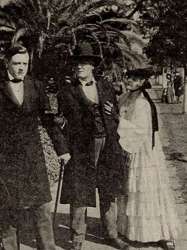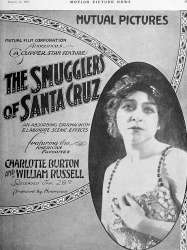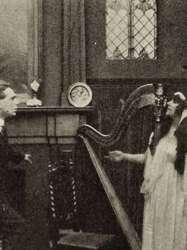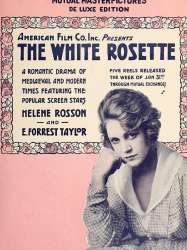Mutual Film

- Infos
- Best films
If you like this company, let us know!
Mutual Film Corporation was an early American motion picture conglomerate best remembered today as the producers of some of Charlie Chaplin's greatest comedies.
It originated with the partnership behind Western Film Exchange, founded in Milwaukee, Wisconsin in July 1906 by Wisconsin natives John R. Freuler (1872-1958), Harry E. Aitken (1877-1956) and Roy Aitken (1882-1976).
In 1910, Freuler would also form a partnership with Chicago film distributor Samuel S. Hutchinson known as the American Film Manufacturing Company.
It was early in 1912 when, with the Shallenberger brothers (Wilbert E. and William Edgar), Crawford Livingston, and others as investors, Charles J. Hite, the President & CEO of Thanhouser Film Corporation, joined John R. Freuler and Harry E. Aitken in the formation of Mutual Film. Hite eventually died in 1914.
As 1912 progressed, the company included auxiliary units such as Keystone Studios Comedies, the Majestic Studios (which would later become the Reliance-Majestic Studios through Harry Aitken's partnership with D. W. Griffith), and the New York Motion Picture Company. In 1915, the workers of Keystone Studios, Kay Bee Studios (a subsidiary of the New York Motion Picture Company) and Reliance-Majestic Studio left Mutual, along with the Aitken brothers, to form the Triangle Film Corporation. Now as complete owners of the former Reliance-Majestic Studio, by 1917 the conglomerate operated as the distributor for four subsidiary studios in California, three of which were in the Los Angeles area and the other in Santa Barbara. They were Signal Film Corporation, Vogue Films, Inc., Lone Star Film Company and American Film Company. Vogue Films, Inc. operated a studio at Santa Monica Boulevard and Gower street in Los Angeles producing two-reel comedy films exclusively.
In 1915, the United States Supreme Court ruled in Mutual Film Corporation v. Industrial Commission of Ohio that motion pictures were a form of business, not an art form, and therefore not covered by the First Amendment.
Shortly after this decision, cities began to pass ordinances banning the public exhibition of "immoral" films, concerning the major studios that state or federal regulations would soon follow. This ruling remained in effect until Joseph Burstyn, Inc v. Wilson in 1952 which declared that film was a legitimate artistic medium with free speech protections.
In 1916, Charlie Chaplin became the highest paid entertainer in the world when he signed a contract with Mutual for a salary of $670,000 per year. Mutual built Chaplin his very own studio and allowed him total freedom to make twelve two-reel films during this fruitful twelve-month period. Chaplin subsequently recognised this period of film-making as the most inventive and liberating of his career, although he also had concerns that the films produced were increasingly formulaic during the length of his contract.
During 1916 and 1917, the Lone Star Film Company had Charlie Chaplin working at their studio at 1025 Lillian Way, in Hollywood. Charlie Chaplin moved on to found United Artists in 1919 with Mary Pickford, D. W. Griffith, and Douglas Fairbanks. In 1919, Mutual Film Corporation ceased production. Like many other companies established at this time, Mutual was eventually absorbed by larger corporations, in this case Film Booking Offices of America and later RKO Radio Pictures.
With the exception of the Chaplin films, most of the Mutual shorts and feature dramas are lost to time and decompostion.
After a 53-year absence, MFC distributed one film, Tears of Happiness, in 1972.
Filmography of Mutual Film (181 films)
Distribution

The Other Side of the Door (1916)
Directed by Tom Ricketts
Origin USA
Genres Romance
Actors Harold Lockwood, William Stowell, May Allison, Harry von Meter, Dick La Reno, Roy Stewart
Set in the 19th century, the plot centered around a man (Harold Lockwood) who is falsely accused murder. The Other Side of the Door was shot in Monterrey, Mexico.

Purity (1916)
, 1h10Directed by Rae Berger
Origin USA
Genres Drama
Actors Audrey Munson, Thomas A. Curran, Nigel De Brulier, William A. Carroll, Alfred Hollingsworth, Eugenie Forde
Purity (Munson), a simple country girl, comes to the city and is hired as an artist's model. A young poet becomes obsessed with her, and is distraught when he learns she has been posing nude. But his distress is diminished when he finds that she intends to use her income from modeling to publish his poetry.

The Secret Wire (1916)
Directed by Tom Ricketts
Origin USA
Genres Romance
Actors Harold Lockwood, May Allison, William Stowell, Harry von Meter

The Smugglers of Santa Cruz (1916)
Directed by Donald MacDonald
Origin USA
Genres Drama
Actors Charlotte Burton, Eugenie Forde, George Periolat, William Russell, Roy Stewart, Roy Stewart

The Soul's Cycle (1916)
Origin USA
Actors Ella Margaret Gibson, Roy Watson
Nadia, the daughter of a nobleman, rejects ancient Greece's senator Theron's love; so he has her and her lover, Lucian thrown into a burning crater. As punishment for this sin, the gods decree that he will roam the earth as a lion until he can right his wrong. A few millennia later, Nadia is now Agnes, the daughter of a millionaire, and Lucian is Arthur, a Wall Street broker.

Directed by William Russell
Origin USA
Actors William Russell, Charlotte Burton, Nell Franzen, Harry Keenan, Marguerite Nichols

The Wraith of Haddon Towers (1916)
, 35minutesDirected by Arthur Maude
Origin USA
Genres Horror
Actors Arthur Maude, Constance Crawley, Beatrice Van
Phillip Drummond (Arthur Maude) is summoned from America to England to attend the bedside of his dying uncle, the Baron Drummond. Upon arriving at the castle where the baron lives, Phillip learns that he has a long-dead ancestor, also named Phillip Drummond, whose murder a century earlier is still a mystery. In a room of the castle that is always kept locked, he encounters the female spirit (Constance Crawley) of his dead ancestor's past lover. Phillip's interest in the paranormal leads him to seek out the haunts of this ghost, during which he finds out that he himself is actually the reincarnation of the former Phillip Drummond. His

The Torch Bearer (1916)
Directed by William Russell
Origin USA
Actors Charlotte Burton, Harry Keenan, Marie Van Tassell, Allan Forrest, Marguerite Nichols, Nate Watt

The Twinkler (1916)
Directed by Edward Sloman
Origin USA
Genres Drama
Actors William Russell, Charlotte Burton, William A. Carroll, William J. Spencer, Clarence Burton

The Undertow (1916)
Origin USA
Actors Franklin Ritchie, Hellene M Rosson, Eugenie Forde, Harry von Meter, Joseph De Grasse

Viviana (1916)
Directed by B. Reeves Eason
Origin USA
Actors Sylvia Ashton, George Periolat, Vivian Rich

The White Rosette (1916)
Directed by Donald MacDonald
Origin USA
Genres Romance
Actors Eugenie Forde, Hellene M Rosson, Harry von Meter, William Stowell, Dick La Reno, Forrest Taylor

Youth's Endearing Charm (1916)
Directed by William C. Dowlan
Origin USA
Genres Drama
Actors Mary Miles Minter, Wallace MacDonald, Gertrude Le Brandt, Harry von Meter, Al Ferguson, Harvey Clark
The film was about a court case and embezzlement.

Embers (1916)
Directed by Arthur Maude
Origin USA
Actors Arthur Maude, Constance Crawley, Nell Franzen, William A. Carroll
Rhea Woodley (Constance Crawley) and her husband Martin (Arthur Maude) have a baby, but the child dies soon after birth, and Rhea's doctor tells her that she cannot risk another pregnancy. Devastated, Rhea becomes withdrawn, and Martin, who is continuing to live an active life, begins to show interest in Rhea's lively cousin Maysie Stafford (Nell Franzen). Wesley Strange (William Carroll), a former suitor of Rhea's, shows up unexpectedly, and when he observes Martin and Maysie flirting, he tells Rhea about it, hoping to drive the Woodleys apart. Rhea still loves Martin, but she fears that she can now no longer meet his needs, so she offers him a divorce, hoping that he can find happiness with her cousin. However, Martin still loves Rhea and declines her offer. Desperate to make Martin happy, Rhea next arranges for him to catch her faking a fondness for Wesley. Taken in by the ruse, Martin finally agrees to a divorce. Maysie then moves in to take over Martin's household, and Rhea, instead of taking up with Wesley, moves to a sanitarium, where she falls deeper and deeper into depression. Realizing that Rhea is fast losing the will to live, her doctor finds her an orphaned infant to care for, and the baby gives Rhea new meaning to her life. Martin meanwhile stumbles across Rhea's diary at his house and learns from it that she never really cared for Wesley Strange and that when he saw them together it was all a ruse to get him to agree to a divorce. He rushes to the sanitarium to be by Rhea's side, and when he finds her with the baby, the couple reconcile when they realize that they still love each other.
 Connection
Connection
